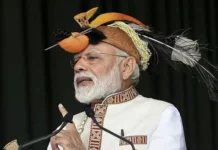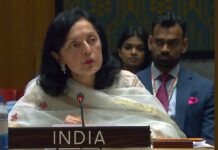 JAKARTA: India has joined nations from Asia and Africa to condemn terrorism in all its form and manifestations and forge concrete cooperation to tackle its spread including through the internet by terrorists.
JAKARTA: India has joined nations from Asia and Africa to condemn terrorism in all its form and manifestations and forge concrete cooperation to tackle its spread including through the internet by terrorists.
After hectic parleys among ministers and diplomats during the Asia-Africa Conference here, the countries have agreed on two resolutions in which terrorism has been mentioned and condemned – Bandung Message 2015 and declaration of Re-invigorating New Asia-Africa Strategic Partnership (NAASP).
These resolutions will be adopted by the Heads of State while a third resolution supporting “independence” of Palestine is likely to be adopted on April 24.
The countries have expressed commitment to develop “concrete forms of cooperation” including in countering the appeal of terrorism, violent extremism, the financing of terrorism including payment of ransom, countering the use of internet for terrorist purposes as well as promoting and protecting human rights while countering terrorism.
“We reiterate the need to enhance inter-regional co- operation and co-ordination in order to develop inclusive and effective strategies to combat terrorism in a comprehensive and integrated manner,” the draft resolution on NAASP said.
India, represented by External Affairs Minister Sushma Swaraj and Minister of State V K Singh, is participating in the 60th Commemoration of the historical 1955 Asian-African Conference, which became the stepping stone for setting up the Non-Aligned Movement during Cold War-era.
Over 50 countries from the third world and 23 Heads of State have arrived here to discuss the issues concerning the two continents which form 75 per cent of the world population and 30 per cent of the total global GDP.
In the draft, the countries have agreed to bolster endeavors to combat transnational organized crime activities and terrorism, including their increased linkages that adversely affect development, political stability and social and cultural values. The countries have expressed “strong and unequivocal condemnation” of terrorism in all its form and manifestations as they agreed to reaffirm the importance of implementing all pillars of United Nations Global Counter Terrorism Strategy in an “integrated and balanced” manner.
“We confirm that terrorism should not be associated with any religion, nationality, civilization or ethnic group,” the draft said.
In the NAASP draft, the countries have resolved to address the conditions conducive to spread of terrorism.
The Conference expressed strong opposition and condemnation of all unilateral coercive measures including sanctions which violate the Charter of the United Nations and undermine the international law.
In the draft resolution on NAASP, the countries agreed to tackle the transnational organized crimes through exchange of information, training, mutual legal assistance, or extradition in line with domestic law and relevant international instruments.
The 1955 conference led by Indonesia’s independence hero Sukarno galvanized global stalwarts like Egypt’s Gamal Abdel Nasser and Prime Minister Jawaharlal Nehru, whose famous ‘Panchsheel’ doctrine was incorporated in 10 principles of international peace and cooperation in declaration.–PTI






